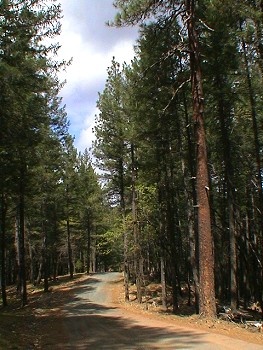
.: Background :.
 This Community Forest originally began, in 1999, as community protest against a proposed land exchange by Bureau of Land Management (BLM) and a private timber company. The Trinity County Board of Supervisors joined with the community in asking BLM to delay the exchange while alternatives were explored. In 2003 the Trinity County Resource Conservation District (TCRCD) Board of Directors decided to take on the project to further explore ways to manage these federally-held lands. In mid-2004, BLM suggested using a new federal tool, Stewardship Contracting, to manage the lands as a community forest. Using this tool, BLM retains ownership and cooperatively works with the TCRCD to manage the forest-based objectives defined by the community. Because of the high level of community involvement between 1999 and 2004, the objectives have long been defined: protecting view sheds, timber harvesting and products to the local mill, recreation, education, fuels reduction, firewood collection, salmon habitat protection, and invasive weeds eradication. In 2005, the first stewardship agreement of the Weaverville Community Forest (WCF) was signed by the BLM and TCRCD to jointly manage 984 acres of forest land. This forest land contains excellent timber land, historic and prehistoric resources, recreational uses and high visual quality for the southwest side of Weaverville. The anadromous West Weaver Creek flows through it, and the WCF provides a wildlife corridor between industrial timberlands to the south and residential parcels to the north. In 2006, the first project was undertaken: a forest health project on 200 acres adjacent to a neighborhood. The timber was sold to the local mill, followed by a firewood sale. In 2008, the WCF expanded as the United States Forest Service signed an agreement for TCRCD to assist in managing 12,000 acres of USFS lands in and surrounding the Weaver Basin. The BLM agreement was renewed for additional 10 years in 2015 and then the USFS agreement was renewed in 2019. Currently a total of 14,963 acres of federal forest land surrounding Weaverville are co-managed as the WCF. Through these partnerships there have been multiple timber harvests on BLM land, the three phases of harvests in the Browns area of USFS land, and a salvage sale on USFS from the 2015 fires. These harvests generated retained receipts which fund stewardship projects. These harvests have also lead to firewood sales to reduce the fuel across the harvest area left by unmerchantable timber. This produced jobs for those preparing the firewood, and provided a fair rate for fire wood to local families. Ongoing projects within the WCF include the maintenance of the Weaver Basin Trail System with the help of the Trinity Trail Alliance and the California Conservation Corps. The WCF is home to the LaGrange Mountain Bike Race and hosted parts of the World Endurance Mountain Bike Race in 2015. The American Endurance Ride Conference also uses the trail system for the La Grange Ditch 50 and Weaver Basin Express 25 competitions. Efforts to use prescribed fire as a tool for fuel reduction projects throughout the WCF are utilized by the USFS, The Watershed Research and Training Center, and the BLM. These efforts protected the town of Weaverville by slowing the fire’s rate of spread as the 2015 Oregon Fire burned across the landscape. The WCF hopes to keep expanding its opportunities by providing community involvement, and by continuing to strengthen the connections between the land and its people. Book Sections about the Weaverville Community Forest Cousins, A., O’Sullivan, C., & Frost, P. (2015). Weaverville Community Forest, California, United States of America. In Jacek P. Siry, Pete Bettinger, Krista Merry, Donald L. Grebner, Kevin Boston, & Christopher Cieszewski (Eds.), Forest Plans of North America (pp. 245–253). https://doi.org/10.1016/B978-0-12-799936-4.00028-X Frost, P. (2014). Spotlight 9.1 Stewardship Agreements: The Weaverville Community Forest. In S. Charnley, T. E. Sheridan, & G. P. Nabhan (Eds.), Stitching the West Back Together: Conservation of Working Landscapes (pp. 177–180). The University of Chicago Press. |
CONTACT > Trinity County RCD, PO Box 1450, #30 Horseshoe Lane, Weaverville, CA 96093 |
